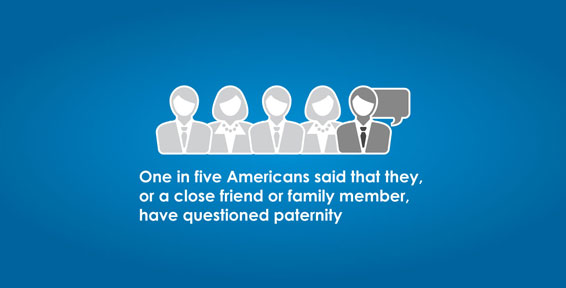An online survey was conducted with a random sample of 1,039 men and women aged 18+, all members of the Impulse Research proprietary online panel. The Impulse Research proprietary online panel closely watches US population demographics and the respondents are representative of men and women aged 18+. Research was conducted in December 2011. The overall sampling error rate for this survey is +/-3% at the 95% rate of confidence.
The survey, commissioned by IDENTIGENE , the largest direct-to-consumer DNA paternity testing laboratory and makers of the IDENTIGENE DNA Paternity Test, reveals that:
- More than one in ten (11 %) adults ages 18 years and older said they have personally been in a situation where a paternity test was appropriate.
- Nearly one in five (18%) said they or a close friend or family member have questioned paternity.
The results of the survey help to uncover the prevalence of paternity questions in the U.S., as well as adults’ intentions to identify biological fathers in the New Year.
- 51% of adults with paternity questions either plan to address their question in 2012 or would like to, but are not sure where to start.
- Men with paternity questions are twice as likely (51%) than women (25%) to address paternity in 2012.
New Year prompts action
The research helps confirm a trend IDENTIGENE has noticed since it launched the IDENTIGENE DNA Paternity Test in retail pharmacies in 2007. Each year the company experiences a spike in first quarter sales: something it attributes, in part, to New Year’s resolutions.
‘The new year definitely seems to trigger many adults with paternity questions to take steps to address their question,’ says Steven Smith, Executive Director for IDENTIGENE . ‘We want adults with paternity issues to know they are not alone and there are many others looking for answers, too. But most importantly, it’s vital for them to know that addressing a paternity question is not only a responsible step to take, but a thoughtful and caring decision, as determining paternity can provide many valuable benefits for all involved.’
Why knowing paternity is important
Although the specific reasoning for paternity testing varies from person to person, the benefits of confirming paternity are multifaceted and far reaching. In the survey, three in four adults (77%) said they believe it’s important for a child to know their biological father.
Click here for tips from our clients on how to talk to a child about paternity testing.
From emotional and health benefits to financial welfare, paternity answers can have many important and positive impacts for children. ‘Knowledge is empowering,’ says Smith. ‘It’s important for children and families to know the truth about paternity, as it can impact a child’s health as well as their emotional health and well-being for years to come.’
If you have questions about paternity tests or other DNA testing services, please contact ourClient Support Center at 888-404-4363, Mon-Frifrom 9 AM to 5:30 PM Eastern Time. Our friendly, expert representatives are ready and happy to help.








Troy Dave Jacobs says
please send me some more inforamtion on the matter. 105 Cypress Grove New Orleans La 70131.
KD says
Hello Troy,
Please explain what you are requesting? Your comment doesn’t tell us. Thanks!
bobsutan says
I just read this article:
http://vitals.msnbc.msn.com/_news/2012/02/07/10333697-paternity-questions-plague-1-in-10-dna-test-firm-says
It cites the following:
“nearly one-third of the paternity tests Identigene performs come back positive, company officials said”
When it says the test comes back positive, does that mean that the child is that of the sampled father? If so then using the 33% figure would mean that of those who question paternity and get tested, they’ve only got a 1 in 3 chance the child is actually theirs. That’s completely reverse what studies put things at just a few years ago the last time I checked into all this. (around 66% turned out to be the man’s child after all)
KD says
Thank you for commenting. Yes, the article is incorrect. It should have said 2/3 of the tests come back positive (the alleged father is not excluded as the father). To our knowledge, the reporter was contacted about the factual error.
TK says
What exactly do they mean there is a +/-3% sampling error rate? Is that regarding the collection of the sample or the testing?
Meisha says
Good afternoon TK,
The sampling error rate mentioned in the article refers to the survey questions and answers, not our test results or lab process. Our testing is 100% accurate because of the safeguards and controls we have in place in the lab. Every test is carefully checked and reviewed by our scientists so we’re very confident in our results. With every test, we know we’ve extracted the DNA correctly from the swabs that we received and analyzed the data properly.
For more information, please see our articles (or FAQs) regarding testing accuracy and probability of paternity.
Here are some articles to provide more information:
http://dnatesting.com/accuracy-vs-probability-in-paternity-testing/
http://dnatesting.com/paternity-test-questions/paternity-test-accuracy/
http://www.dnatesting.com/dna-laboratory/dna-testing-laboratory-accreditations
I hope this information helps. If you have any additional questions or concerns please feel free to contact us 888-404-4363 and we will be happy to assist you.
Todd S. says
Greetings! Where can I find the full report detailing the results of the survey conducted by Identigene? Thank you!
Identigene says
Hi, Todd. The full report for this survey is not made available online: only the summary as outlined in this post.